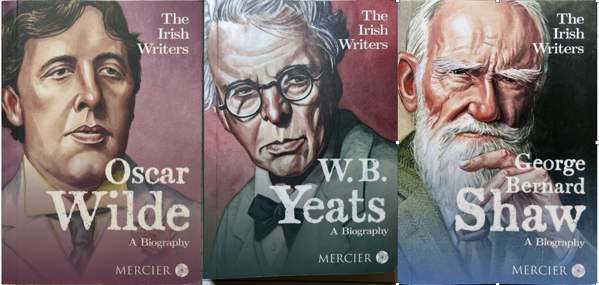Finished:
- The Irish Writers: Oscar Wilde by David Pritchard 📚
- The Irish Writers: W.B. Yeats by David Ross 📚
- The Irish Writers: George Bernard Shaw by David Ross 📚

A neat little set of literally mini-biographies – each about 200 pages and about 4"x6" – very easy to hold in the hand. Bought from a newsagent’s across the street from Trinity College in June 2025. Apart from their major works, I knew very little of these authors so these little biographies suited me just fine. Stray observations:
- Ross is the better writer of the two. His command of context and content, and his style, simply made his two books more enthralling and readable. The first chapter of his Shaw book, “Two Cities,” summarizes in 11 pages the economic, historic, religious, and cultural conditions of London and Dublin. It is a confident, breathtaking summary that provides a context for the emergence of Shaw – and Wilde and Yeats – onto the cultural and literary scene.
- The Wilde book compresses an awful lot into a small space. What it illuminated for me was how long it took Wilde to “become” Wilde. I did not know how relatively late in life his success came, with his discovery of plays and their witty, aphoristic dialog being perhaps his ideal literary form. I also did not know that his father also indulged in sexual misadventures, which brought stress, shame, and hard times to his mother and family. The sins of the father…
- While Yeats and Shaw did not engage in sexual adventures in the same way, they had their own hangups and issues with women that distracted their wives and caregivers. Yeats sponged off of them, Shaw adored the adoration of his younger female correspondents while stringing them along and keeping his paper conversations a secret from his wife.
- An irony that linked all three of these Irishmen: their desire to be active players on the larger literary stage of London. From Ross’s book on Shaw:
Of the three, Yeats was most involved with their home country. Part of his vision was to establish a modern Irish literature, written in English, and Ireland continued to be a prime source of his inspiration, even though he spent as much time in England as he did there. Wilde was not concerned with Ireland. Shaw never forgot that he was an Irishman, and like Yeats was a Unionist who believed in Home Rule. But, though much in his thought and writing is Irish, he did not feel the rootedness in Irish history and culture that Yeats felt and nourished. He wanted to reform not Ireland or England, but the world.